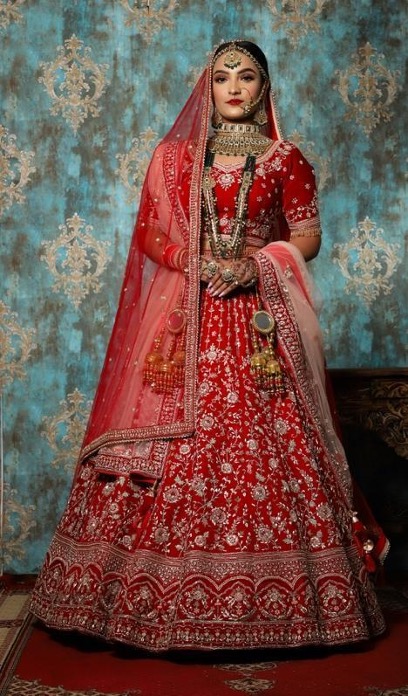Listen to the full story here:
Recent guidelines introduced in the Sikh religion in India have made their way over to Canada, leading some gurdwaras to “ban” a commonly worn wedding outfit: the lehenga.
The Takht Sri Nanded Sahib, a holy Sikh site in Maharashtra, India, started enforcing new dress codes which currently only affect brides, along with several “rules” for wedding ceremonies and conduct.
These include using the surnames Singh and Kaur on wedding invitations — even if they are not the marrying couple’s actual surnames‚ — no flowers or dupattas (scarf) can be carried by relatives over the bride’s head as she makes her way into the gurdwara for the wedding ceremony, and the lehenga ban.
Instead, brides are urged to wear a salwar kameez, an outfit with a longer top reaching knee-length with looser pants underneath.
“I personally do not agree with hard and fast rules being made by the five takhts representatives, however, I do think that they can provide guidance. At the end of the day, Sikhi is all about being provided guidance,” says Harleen Hundal, a Canadian Sikh woman.

The Takhts in India are meant to provide religious guidance to Sikhs globally without being authoritative. However, their new rules have come with controversy.
“The Singh Sahibs (men who represent the Sikh religion in India in the Takhts) have urged the Sikh community to follow these guidelines. Strict action will be taken against those who do not comply,” Gagandeep Singh, a Punjab-based journalist, tweeted.
These rules became public in late December 2023, but have begun making their way over to Canadian gurdwaras, some of whom have told brides not to come if they wear lehengas.
HK — who is going by initials for privacy concerns — was supposed to get married at the Malton Gurdwara this summer, already having purchased a lehenga.
She was told by the gurdwara she cannot wear her lehenga for her wedding because of the rules implemented in India.
OTR spoke to reps at the Malton Gurdwara for confirmation.
The Malton Gurdwara changed its rules not too long after the ban took effect in India.
They stated that if someone shows up to the gurdwara in a lehenga, they “won’t do the ceremony.”

Brides are being told they cannot wear lehengas if they booked their weddings after December 2023, when the rules took effect in India.
However, if they booked their weddings prior to the rule change, they can wear lehengas but “no stomach showing and full sleeves.”
Once the changes were public, Sikhs on Reddit began to discuss the ban.
“Until you have a committee with diverse members, especially including youth and women, I will continue to question the validity of the groupthink ‘Sikhs’ so stubbornly partake in,” one American Sikh user commented about the changes.
These new changes aren’t the only changes in the last few years by the Takhts regarding wedding ceremonies.
In 2020, they completely banned destination weddings for the Anand Karaj ceremony. The Anand Karaj is the official wedding ceremony for Sikhs.
“The reason for this is that many resorts, palaces, banquet halls, etc., are places where drugs, alcohol, and general debauchery reign, and thus, the energy of those venues is misaligned with the values of the Anand Karaj, and traditional marital and family values,” Hundal says.
While Hundal feels the efforts of modest dressing in sacred religious spaces is fair, it is not fair to outright ban all lehengas as they can “be made, or altered, to be modest.”
A form of a modest lehenga which doesn’t show any skin on the midriff is called a ghagri and is worn by Jain nuns in India. The ban will affect ghagris, and gurdwaras such as the Malton Gurdwara are urging brides to wear modest outfits like a salwar kameez.
Sabrina Cheema, another Canadian Sikh woman, doesn’t find the rules to be acceptable, especially in Canada.
Cheema says lehengas have been an outfit Punjabis wore for “centuries” and if they were deemed acceptable in “more strictly conservative times, why is now the time we’re calling them ‘immodest’ or ‘indecent?’”
She also finds it unacceptable that Sikhism — a religion that prides itself on equality among all races, religions, creeds, and genders — would implement a rule that only affects women.
“I’m still far from getting married, but I hope the rules change by the time I do,” she said. “Punjabi women have worn lehengas forever, we can alter them to be more modest, but banning us from wearing cultural clothes isn’t okay, especially for women who want to partake in their cultural wedding ceremony.”
For women that would like to wear a lehenga, they should contact the gurdwara they plan to go to and find out the regulations.
While many gurdwaras have implemented the rules, others have not.
Hundal wonders if the new rules are meant to keep weddings about the ceremony of marriage, rather than having a grand affair.
“As a lawyer, I know how much divorce rates have risen, almost simultaneously alongside the rise of more grandiose, fanciful weddings. If we as a world keep the focus on marriage, as opposed to the wedding, would more couples and therefore families see long-term success together?” she said.
Ultimately, Hundal says women who do want to wear lehengas and people who want to have a grand wedding should not be subjected to judgment regardless of the new rules.
“Sikhism and Sikhi is all about guidance, but if one decides not to follow that guidance they do not deserve judgement, but at the same time, they cannot simply bring their debauchery into sacred spaces; two things can remain true at the same time.”
Reporter for On The Record, winter 2024. Fourth-year journalism student at Toronto Metropolitan University.

